railway accidents
Railway Accidents
Fortunately mostly without victims
There have been a number of accidents at Yeovil stations over the years, although most were minor with few injuries.
-
1 December
1853
- The first
accident of
the Durston
line
occurred on
Thursday 1
December
1853 when
Levi Doble,
one of the
porters,
while
between some
trucks, had
his knee
crushed by
the buffers.
He was taken
to his
lodgings in
South
Street,
where
amputation
of the leg
was
performed
under the
influence of
chloroform
by Messrs
Sherland and
Coles -
Wells
Journal, 10
December
1853
-
20 September 1860 - the rear coach of a train travelling between Yeovil Junction and Hendford derailed on the points leading onto the branch
-
September 1861 - Robert Lintoe fell on the line at Hendford Old Station, train ran over both his legs and he died within four hours. (see Gallery for report).
-
October 1860 – a goods train travelling towards Hendford collided with a passenger train coming the other way
-
April 1862 - "Fatal Accident on the Railway - On Saturday last a man named Taylor, of this village [Stoford], eighty-three years of age, was crossing the line not far from the Yeovil Junction station, when the down express train dashed by, and he was killed. We believe he was rather deaf, and therefore could not hear the approaching train. He was a tailor by trade." Wiltshire Independent, 17 April 1862
-
22 August 1865 - William Ramsdale fell off the engine at Town Station and the tender wheels ran over his left foot, requiring amputation (see Gallery for report).
-
12 June 1886 – a collision between a goods train and a passenger train to Yeovil Town caused by confusing signals
-
13 July 1887 – a locomotive collided with the coaches to which it was going to couple, knocking them almost 40 yards (37m) along the track and injuring nine passengers
-
26 July 1887 – an empty passenger carriage derailed while it was being added to a London train
-
5 June 1890 - James Brown of Tabernacle Lane killed by a train at Sherborne.
-
02 April 1900 - a collision at Yeovil Town Station. Details unknown, but photos below.
-
8 August 1913 - the locomotive 'City of Bath' ran into a stationary passenger train at Pen Mill. There were two fatalities, including 18-year old passenger Edith May Groves who died from her wounds received in the accident, and ten injuries. The official primary cause was driver error and the secondary cause was signaller error. See report below.
-
4 July 1914 – when a coupling of an eastbound goods train broke, the rear part of the train collided with the front 200 yards (180m) from Yeovil Junction, knocking the wooden upper storey off the west signal box
-
20 August 1918 – a collision between locomotives occurred due to the signalman not following rules
The official Board of Trade report on the fatal accident of 8 August 1913 at Pen Mill stated - "In this case as the 2:15 pm excursion train from Paddington, consisting of an engine, tender and nine vehicles, was standing on the down platform line at Yeovil Station, it was run into from the rear by the 1:20 pm. train from Paddington, consisting of an engine, tender and seven vehicles. The speed of the latter train at the time of the collision was very low, but owing to the fact that the brake blocks were at the time applied to the wheels of the excursion train, the brunt of the collision fell on the rear vehicle of it; the bogies of that vehicle, which was a third class carriage, were displaced by the collision, its steel under-frame was crushed and bent, and the superstructure at its rear end was completely wrecked, the three rear compartments being crushed together.
It is believed that there were about 20 passengers travelling, in this vehicle; two of these were killed instantaneously and 10 were injured, the injuries in two of the latter cases being exceedingly serious. The next vehicle of the excursion train, which was a brake third class carriage: was also slightly injured at its rear end."
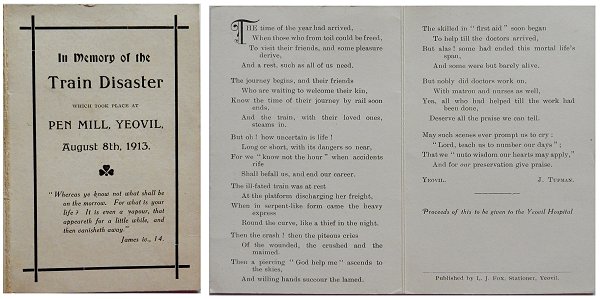
From my
collection
An 'In Memoriam' card produced following the disaster of 8 August 1913 containing a poem (reproduced below) by J Tupman with proceeds going to the Yeovil Hospital.
| The
time of
year had
arrived When those who from toil could be freed, To visit their friends, and some pleasure derive, And a rest, such as all of us need. The journey begins, and their friends Who are waiting to welcome their kin, Know the time of their journey by rail soon ends, And the train, with their loved ones, steams in. But oh ! how uncertain is life ! Long or shore, with its dangers so near, For we "know not the hour" when accidents rife Shall befall us, and end our career. The ill-fated train was at rest At the platform discharging her freight, When in serpent-like form came the heavy express Round the curve, like a thief in the night. Then the crash ! then the piteous cries Of the wounded, the crushed and the maimed. Then a piercing "God help me" ascends to the skies, And willing hands succour the lamed. The skilled in "first aid" soon began To help till the doctors arrived, But alas ! some had ended this mortal life's span, And some were but barely alive. But nobly did doctors work on, With matron and nurses as well, Yea, all who had helped till the work had been done, Deserve all the praise we can tell. May such scenes ever tempt us to cry: "Lord, teach us to number our days"; That we "unto wisdom our hearts may apply," And for our preservation give praise. Yeovil J Tupman |
gallery
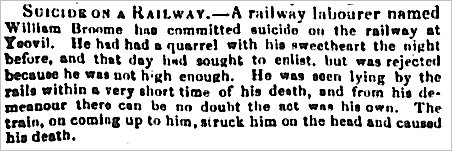
One of the early reported train fatalities in Yeovil, was in the 2 December 1854 edition of the Gloucestershire Chronicle - William Broome's 'suicide by train'.
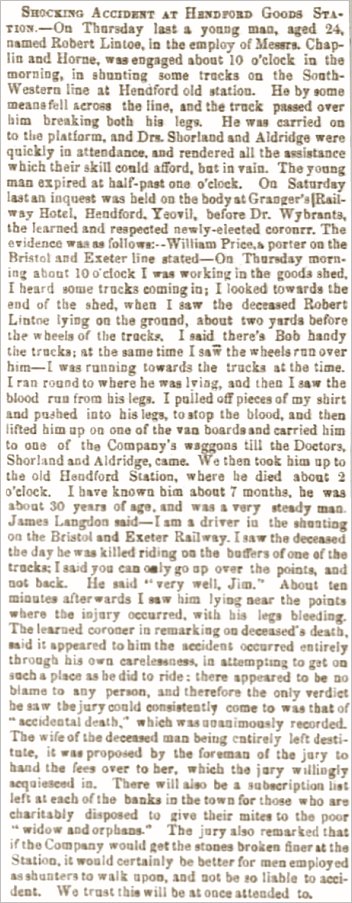
Courtesy of John
Penny
The report of Robert Lintoe's accident and death at Hendford Old Station from the 11 September 1861 edition of the Taunton Courier & Western Advertiser.
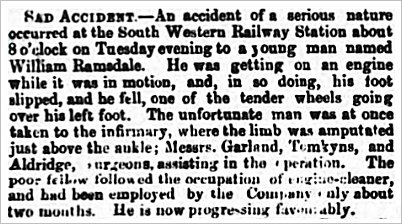
Report of the accident resulting in William Ramsdale losing his leg, from the 25 August 1865 edition of the Western Gazette.
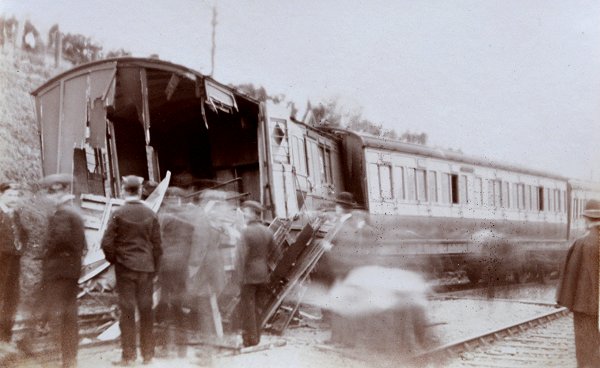
Courtesy of Bill and Audrey Robertson
The damage caused by a collision at Yeovil Town Station on 2 April 1900. Notice the policeman in attendance at far right.
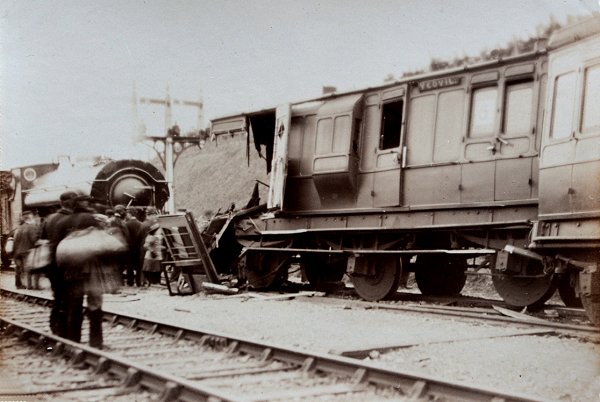
Courtesy of Bill and Audrey Robertson
The same shunt at Yeovil Town Station on 2 April 1900, seen from a different angle.
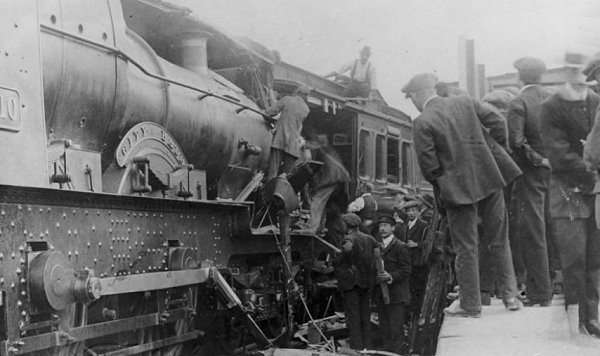
From my
collection
The locomotive 'City of Bath' ran into a stationary passenger train at Pen Mill on 8 August 1913. 18-year old passenger, Edith May Groves, died from her wounds received in the accident.
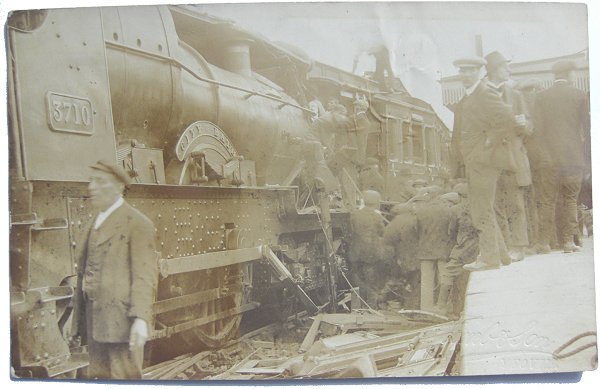
From my
collection.
This photograph
features in my
book 'Secret
Yeovil'
Hard to believe these days but Witcomb & Sons, the Yeovil photographers, actually produced a postcard of the fatal 1913 Pen Mill accident.
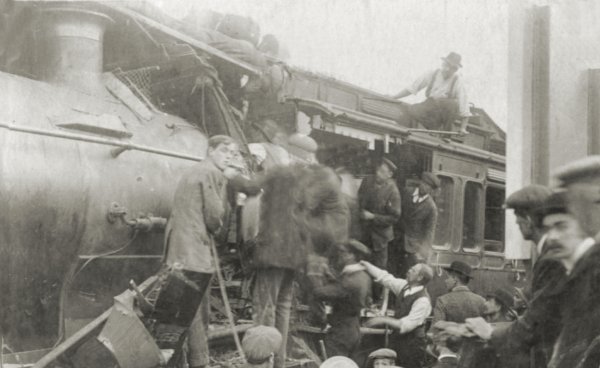
Another photograph produced as a postcard by Witcomb & Sons.

Another Witcomb photo showing the crowd of onlookers.
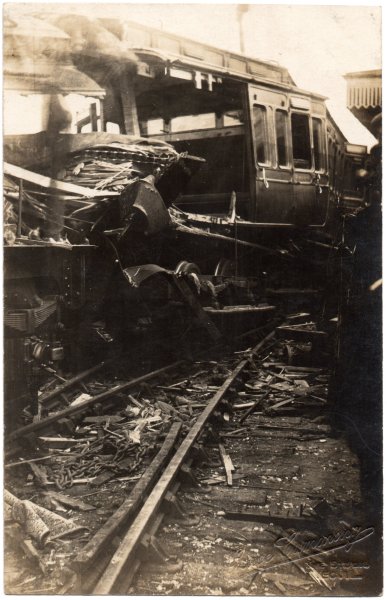
From my
collection.
This photograph
features in my
book 'Secret
Yeovil'
.... and so did Grace Cumming. The 8 August 1913 Yeovil rail crash photographed by Grace Cumming. Grace was only active as a professional photographer in Yeovil between c1907 and 1913, the year of her death.
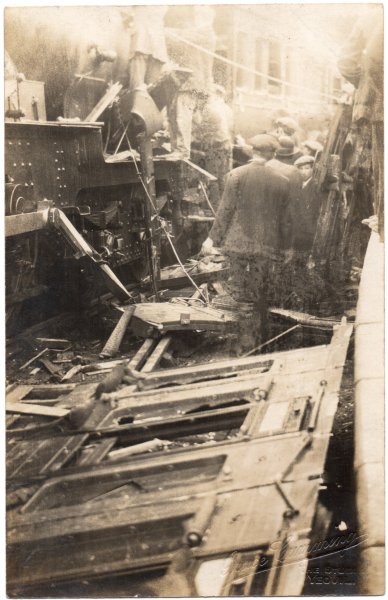
From my
collection.
This photograph
features in my
book 'Secret
Yeovil'
.... and another photograph of the same accident by Grace Cumming.

... and the final photograph of the accident by Grace Cumming.
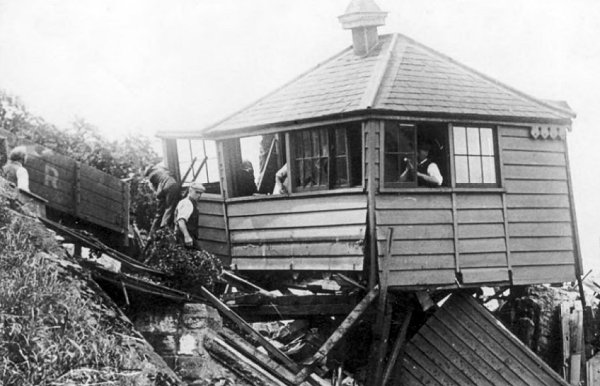
On 4 July 1914, when a coupling of an eastbound goods train broke, the rear part of the train collided with the front 200 yards (180m) from Yeovil Junction, knocking the wooden upper storey off the west signal box.
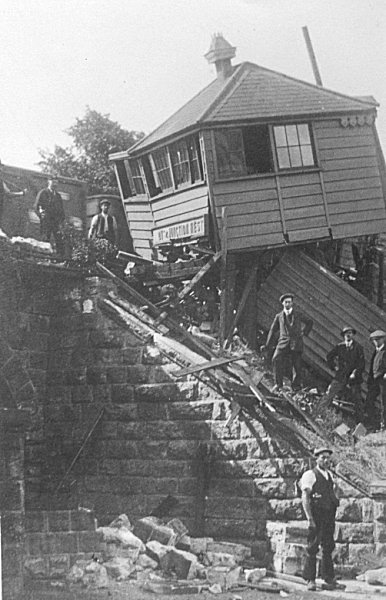
A different photograph of the same accident.
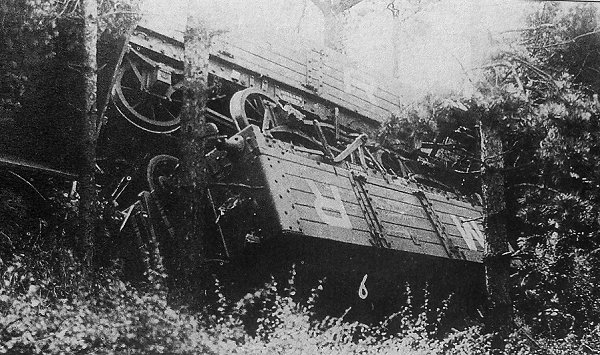
.... and more damage at the same accident.

An undated postcard, but many thanks to Mike Lucas for the following observations "a tender from an N class 2-6-0 before it assumed its Southern Railway number, ie 1850. From 1925, when it was built, until 1932, when 1,000 was added to the number, it was identified as A850. If you look closely at the picture you will see that the prefix is not an E but an A (for Ashford). As a general rule, when the Southern Railway rationalised its numbering, former SECR designs (the N class was introduced in 1917) had 1,000 added to their number, while former LBSCR locos had 2,000 added. The loco subsequently moved away from the West Country and during the 1950s was allocated to Faversham (73E), where it probably ended its days. The loco in question was withdrawn in 1964 bearing its BR number, 31850."
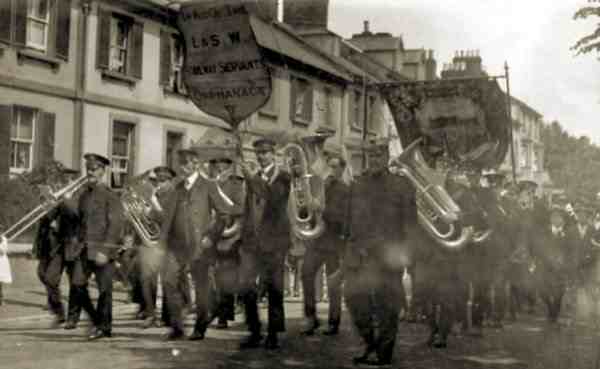
A 1920's photograph of a parade in Station Road by railway men - complete with their band - in support of the L&SW Railway Servants' Orphanage.